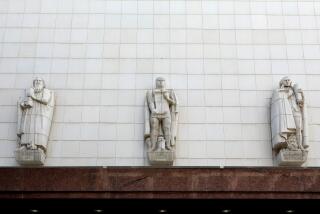The Appeal of a Senior Auxiliary Court
- Share via
I don’t have the expertise in such matters that Dear Abby and Ann Landers have, but a 75-year-old man has written me about what he calls his “three-quarter life crisis.”
I don’t think he wants me to give him advice; he just wants me to sympathize with him.
F. Edward Little, a lawyer, says his mid-life crisis didn’t bother him very much. “But this three-quarter life crisis has me dispirited and discouraged. I am really down.”
Little is not discouraged by his health or his physical or mental capacity. On the contrary, he says he is in buoyant health, and as mentally sharp as ever. He swims, runs, eats vegetables and makes love.
What troubles him is that there is no market for his energies. “I’m dead in the water with my motor tuned for racing.”
I have heard from F. Edward Little before. He is the man, you may remember, who wrote to complain about my columns reporting on the difficult time I had after my coronary bypass.
“Aren’t you coming on a little heavy?” he wrote, evidently referring to my description of my experiences in intensive care, when I had delusions of having been kidnaped and held prisoner, and also my later depression, weakness and frustration.
Little said he had recently had a bypass and that it was a piece of cake. He enclosed an article in which he described his operation in what I called a “relentlessly blithe style.”
He wrote: “I left my office early, jumped into my little sports car, whizzed over to the hospital, grabbed my overnight bag, ran up the steps . . . and said to the nice lady, ‘I’m Mr. Little. I’m here for my thing.’ ”
I found that a little hard to take. I recall that I was almost as blithe as Little before my operation, but not afterward. He said that he was out of intensive care in one day, out of the hospital in less than one week (both records) and was told that he would soon be able to drive, make love, get back in the pool and carry out the rubbish.
That was a few years ago. Now Little has reached the three-quarter century mark and is frustrated because nobody seems to value his energy, his experience and his ability.
He encloses a letter he has written to Gov. George Deukmejian urging him to consider using senior auxiliary judges to alleviate our congested court calendars and “utilize an untapped well of wisdom and experience.”
Little cites his own qualifications. He has practiced law in Los Angeles for 45 years, with “honor, dignity and some considerable success.” He has frequently sat pro bono as a judge pro tem in the Municipal Court, and is a senior arbitrator for the American Arbitration Assn.
As for fitness, Little states that he weighs the same as he did in high school, he watches his diet, does not drink or smoke, and runs and swims several times a week.
He suggests that many other competent septuagenarians would be equally qualified, and proposes “a small corps of senior auxiliary judges with a minimum age of 70.”
He says, “I would like to see the Senior Auxiliary Judges Corps as an elite group. Selection standards should be at least as high as those for normal judicial appointments. Selection should constitute a highly prized distinction. We should have status and a mark of respect for having served our profession faithfully over a long period of time. You wouldn’t believe what we would give you back.”
I have no doubt that Little is right in thinking that there must be a large number of lawyers in their 70s who could serve the state as auxiliary judges, and I don’t doubt that they are needed.
One remembers that the justices of the U.S. Supreme Court often serve not only into their 70s but also into their 80s and 90s.
I am reminded of the remark attributed to Supreme Court Justice Oliver Wendell Holmes when he was in his 90s. Holmes was standing on Pennsylvania Avenue with a colleague when a shapely young government office worker trotted by on her lunch break.
Holmes is said to have remarked, “Oh, to be 70 again!”
If a corps of senior auxiliary judges could restore that kind of youthful spirit to our municipal courts, it might not be a bad thing.


